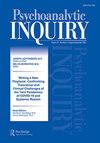思乡病:与分居和离婚的孩子的特殊关系
IF 0.5
4区 心理学
Q3 PSYCHOLOGY, PSYCHOANALYSIS
引用次数: 0
摘要
摘要本文讨论了母乳喂养后突然断奶对非常年幼的孩子的类似影响,以及当母亲是主要看护人,孩子主要依赖母亲的家作为他们的家时,与父亲过夜的养育机会。考虑到幼儿无意识幻想的作用,特别是在这些情况下将母亲视为对幼儿的拒绝,敌对和迫害,以及这些早期经历对儿童,青少年和成人发展的短期和长期影响。在健全的精神分析儿童发展理论和研究的应用和儿童的法律最大利益标准之间存在的冲突提出了讨论。最后,这些不良体验如何影响怀旧情绪的产生和使用。关键词:思乡病分居/离婚母乳喂养/断奶不受政府管理的养育方式遗弃幻想怀念感谢薇薇安·埃斯金博士,她向我介绍了梅兰妮·克莱因在断奶和幼儿无意识幻想生活在这种发展经验如何内化中的作用方面的贡献。我还想感谢Anice Jeffries提出的关于家庭和本垒概念的重要问题,这些问题在撰写本文时发生在多次通信中。披露声明作者未报告潜在的利益冲突。这些母亲不是我的病人。他们来找我,完全是因为他们年幼的孩子表现出极度的痛苦。这些孩子的年龄从10到24个月不等。试点研究包括4名男孩和4名女孩,都是头胎婴儿。父亲们没有参与这项初步研究,因为研究的重点是在他们的主要看护人家里的痛苦婴儿/幼儿。根据这些母亲的说法,当他们的婴儿/幼儿和他们在一起时,父亲没有注意到任何痛苦的迹象Krystal (Citation1978)关于早期创伤的开创性论文揭示了睡觉是对创伤的一种防御不同的作者观察到幼儿在非常不同的情况下和非常不同的时期与母亲分离。然而,小孩子的反应似乎很相似作者没有提到婴儿和幼儿从出生开始就与父母各住一半时间的情况。本文所讨论的情况是指与母亲在一起的主要时间和与父亲在一起的时间的增加因为在我的初步研究中,我提到的年幼的孩子才刚刚开始说话,所以不可能知道孩子们和他们的父亲呆在一起,去他们的父亲家里,因为他们的母亲不爱他们。当这些孩子变得更会说话时,我有机会对他们进行跟踪,后来一些孩子表达了他们的担忧,他们的母亲不爱他们,这就是为什么他们被从母亲的家里送到父亲那里。作者简介:linda Gunsberg博士是美国精神分析协会精神分析与法律讨论小组的联合主席。同时,她还是《精神分析探究》杂志的咨询编辑。从1997年到2020年,她在华盛顿广场研究所创建了家庭法和家庭法医培训计划,并担任该计划的主席,该计划为法院系统内的家庭提供了一种跨学科的方法。Gunsberg博士在《离婚和监护手册:法医,发展和临床观点》一书中共同编辑和撰写章节;父亲和他们的家庭;《精神分析理论、研究和临床实践:阅读约瑟夫·d·利希滕贝格》。最近,她在《儿童精神分析研究》(2019)杂志上撰写并编辑了一个关于分居和离婚的章节。在《精神分析探究》(Psychoanalytic Inquiry)杂志上,Gunsberg博士参与编辑并撰写了以下期刊:《分离-个性化重访》;法庭上的精神分析学家;和收养之旅。Gunsberg博士在纽约大学心理治疗和精神分析博士后培训项目中接受了精神分析方面的培训。在她的私人诊所里,她接待了所有年龄段的儿童和成年人。本文章由计算机程序翻译,如有差异,请以英文原文为准。
Homesickness: Its Particular Relevance to Children of Separation and Divorce
ABSTRACTThis article addresses the similar effects on the very young child of abrupt weaning after breastfeeding, and overnight parenting access with the father when the mother is the primary caretaker and the child is primarily attached to the mother’s home as their home. The role of the young child’s unconscious fantasies is considered, particularly in perceiving the mother in these situations as rejecting, hostile and persecutory towards the young child, as well as the short-term and long-term effects of these early experiences on child, adolescent and adult development. The conflict existing between the application of sound psychoanalytic child development theory and research and the legal Best Interests of the Child standard is raised for discussion. Finally, how these adverse experiences impact on the creation and use of nostalgia are addressed.KEYWORDS: Homesicknessseparation/divorcebreastfeeding/weaningovernight parenting accessabandonmentfantasiesnostalgia AcknowledgmentsI am indebted to Vivian Eskin, Ph.D., who introduced me to Melanie Klein’s contributions on weaning and the role of the young child’s unconscious fantasy life in how such developmental experiences are internalized. I also wish to acknowledge Anice Jeffries for her important questions raised regarding the concept of home and home-base, which took place in multiple communications while writing this paper.Disclosure statementNo potential conflict of interest was reported by the author.Notes1 These mothers were not patients of mine. They consulted me solely due to the extreme distress manifested by their young children. The children ranged in age from 10 to 24 months. The pilot study consisted of 4 boy and 4 girls, all first-born children. Fathers were not participants in the pilot study since the focus was on the distressed infants/toddlers in the homes of their primary caretakers. According to these mothers, the fathers did not notice any signs of distress when their infants/toddlers were with them.2 Krystal’s (Citation1978) seminal paper on early trauma reveals going to sleep as a defense against trauma.3 Different authors have observed young children’s separations from their mothers under very different circumstances and for very different periods of time. However, the responses of the young children seem similar.4 The author is not addressing situations where infants and young children live half-time with each parent since the beginning of the child’s life. Situations addressed in this article refer to primary time with the mother and the introduction of greater increments of time with the father.5 Since the young children I referred to in my pilot study were only beginning to be verbal, it was not possible to know that children experienced spending time with their father and going to their father’s home as their mother not loving them. I had the opportunity to follow up on these children as they became more verbal, and it was at a later time that some of the children expressed their concern that their mothers did not love them and that is why they were sent away from their mother’s home to their father.Additional informationNotes on contributorsLinda GunsbergLinda Gunsberg, Ph.D., is Co-Chair of the Psychoanalysis and Law Discussion Group of the American Psychoanalytic Association. Also, she is a consulting editor for the journal, Psychoanalytic Inquiry. From 1997–2020, she created and was chair of the Family Law and Family Forensics Training Program at Washington Square Institute, which offered an interdisciplinary approach to working with families within the Court system. Dr. Gunsberg has co-edited and written chapters in the volumes, A Handbook of Divorce and Custody: Forensic, Developmental, and Clinical Perspectives; Fathers and Their Families; and Psychoanalytic Theory, Research, and Clinical Practice: Reading Joseph D. Lichtenberg. Recently, she has contributed to and was editor of a section on separation and divorce in the journal, Psychoanalytic Study of the Child (2019). For Psychoanalytic Inquiry, Dr. Gunsberg has co-edited and contributed to the journal issues: Separation-Individuation Revisited; The Psychoanalyst in the Courtroom; and The Adoption Journey. Dr. Gunsberg received her psychoanalytic training at the New York University Postdoctoral Training Program in Psychotherapy and Psychoanalysis. In her private practice, she sees children of all ages and adults.
求助全文
通过发布文献求助,成功后即可免费获取论文全文。
去求助
来源期刊

Psychoanalytic Inquiry
PSYCHOLOGY, PSYCHOANALYSIS-
CiteScore
1.00
自引率
33.30%
发文量
65
期刊介绍:
Now published five times a year, Psychoanalytic Inquiry (PI) retains distinction in the world of clinical publishing as a genuinely monographic journal. By dedicating each issue to a single topic, PI achieves a depth of coverage unique to the journal format; by virtue of the topical focus of each issue, it functions as a monograph series covering the most timely issues - theoretical, clinical, developmental , and institutional - before the field. Recent issues, focusing on Unconscious Communication, OCD, Movement and and Body Experience in Exploratory Therapy, Objct Relations, and Motivation, have found an appreciative readership among analysts, psychiatrists, clinical psychologists and a broad range of scholars in the humanities.
 求助内容:
求助内容: 应助结果提醒方式:
应助结果提醒方式:


